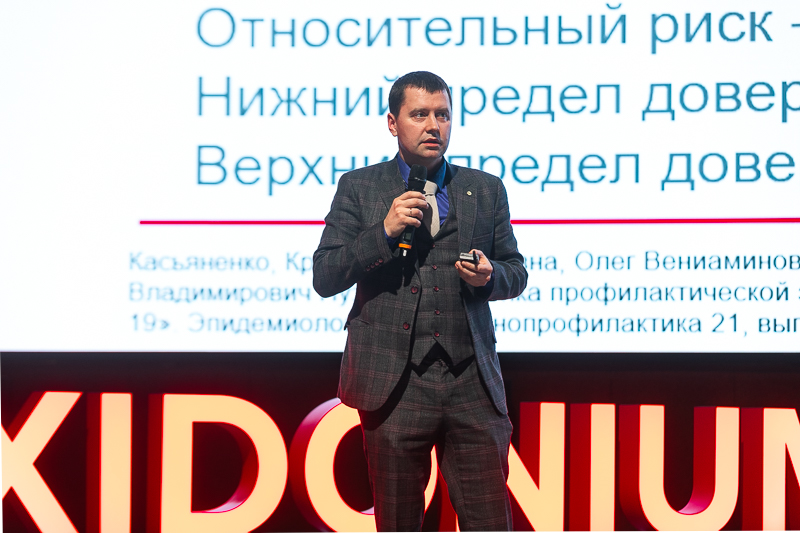
How to avoid getting sick during ARVI and influenza season: experts' opinion

Rospotrebnadzor recorded a new round of growth in the incidence of influenza and acute respiratory viral infections with about 978 thousand cases[1] registered by the end of January. Leading experts discussed current issues in the prevention and treatment of ARVI and COVID-19 at the Polyoxidonium Talks conference in Moscow on February 3, joined by over 2000 specialists.
The COVID-19 pandemic caused healthcare professionals to focus more on the consequences of viral diseases. Academician of the Russian Academy of Sciences, Infectious Disease Specialist Aleksander Gorelov emphasized:
Long COVID still remains completely unexplored, and healthcare professionals predict that, for example, damage caused by coronavirus disease to the central nervous system can persist for 4–5 years, as reported by Mikhail Kostinov, Corresponding Member of the Russian Academy of Sciences, Dr. habil. med., Professor.
The conference experts announced a successful experience of treating people with azoximer bromide (Polyoxidonium®), suffering from long COVID. Konstantin Kozlov, Dr. habil. med., Professor of the Department of Infectious Diseases of the Military Medical Academy of St. Petersburg, revealed a study involving 90 adult patients with confirmed COVID-19 who had health-related complaints persisting for more than 12 weeks from the onset.

This study identified a statistically significant decrease in the severity of such symptoms as general weakness, muscle and joint pain, dizziness, impaired concentration and loss of sense of smell in the azoximer bromide group. At the same time, no adverse events were registered during azoximer bromide administration[2].
On top of the consequences they have already suffered from previous diseases, patients often get infected again. Recurrent infections in conjunction with weakened immunity most commonly occur in children. Olga Zaitseva, Dr. habil. med., Professor, shared certain WHO data in her speech, revealing that adults suffer from acute respiratory diseases 2-4 times a year, while preschool children contract the same diseases more than 6 times in 12 months.

Frequent acute respiratory infections (ARI) pose a serious threat as in 16–30 % of cases they go hand in hand with complications, including pneumonia, sinusitis, otitis, tonsillitis, bronchial asthma, respiratory and heart failure and etc.
People can avoid recurring infections by focusing on preventive measures and enhancing the immune system. Olga Zaitseva mentioned the study exploring the application of the immune-correcting drug Polyoxidonium® in the prevention of ARI and COVID-19 in 900 children from 3 to 10 years old:
Sergei Karpishchenko, Dr. habil. med., Professor, agrees with this statement. A retrospective multicenter study among 16365 patients (64 % of adults and 36 % of children) has confirmed the favorable effects of Polyoxidonium in patients with inflammatory infections of ENT organs.
Follow the link to watch the conference video:
Dialogues on immunity — from meta-analysis to personal practice — YouTube

Reference information about Polyoxidonium®
Polyoxidonium is mainly indicated for the prevention and treatment of acute respiratory viral infections and influenza in adults and children aged 3 years or older[3]. The product is commonly used in Russia and the EU. It has a large evidence base consisting of 26 clinical studies, including double-blind placebo-controlled trials. In 2022, the meta-analysis titled “Experience of Using Azoximer Bromide for the Prevention of Acute Respiratory Infections and COVID-19 in Adults in High-Risk Groups (Red Zone Medical Workers)” was published, which covered 1141 participants aged 18 to 69 years.
More than 350 articles have been published about the drug, including works in PubMed and Google Scholar databases. Polyoxidonium® is mentioned in the Temporary Guidelines on the Prevention, Diagnostics and Treatment of New Coronavirus Infection (COVID-19), in the FMBA Guidelines on the prevention and treatment of influenza and other ARVIs during the COVID-19 pandemic, and the Flu in Adults clinical recommendations of the Russian Ministry of Health for the prevention and treatment of infection. Polyoxidonium® is included in the list of VEDs.
1 https://t.me/rospotrebnadzor_ru/1587
2 Assessment of the effect of azoximer bromide on the severity of clinical manifestations in persons who have suffered infection caused by SARS-CoV-2 / K. Kasyanenko, O.V. Maltsev, K.V. Kozlov [et al.] // Infectious Diseases. - 2021. - V. 19. - No. 4. - P. 15-22. - DOI 10.20953/1729-9225-2021-4-15-22.
3 Product form, tablets
Therapeutic Archive publishes results of open-label randomized prospective study of efficacy of Artneo® in patients with knee osteoarthritis


